Jairam Ramesh shared his wisdom “On the Journey of Writing”
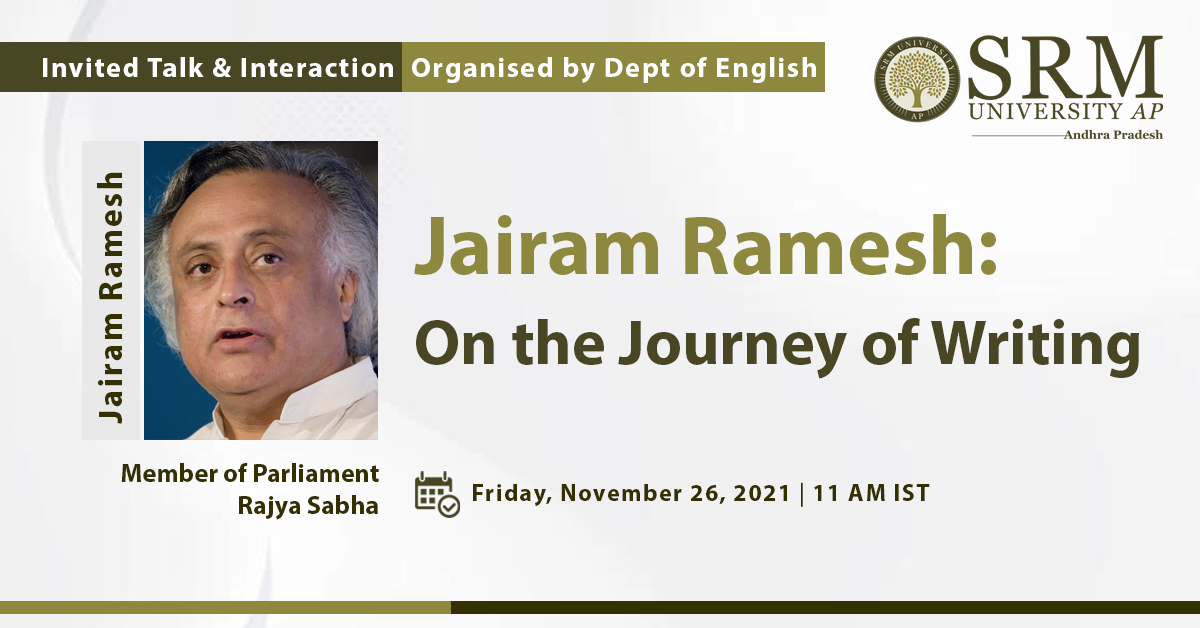 SRM University – AP, the multidisciplinary research-intensive university located at the heart of Amaravathi, initiated another unique programme titled “University Eminent Lecture Series for Liberal Arts and Social Sciences” today with Mr Jairam Ramesh – Member of Parliament, Rajya Sabha. Mr Ramesh participated in a vigorous interactive discussion “On the Journey of Writing”. Ramesh shared his process of and insights into writing and interacted with the members of the audience comprising faculty, students, scholars and attendees across the country. His generosity in terms of sharing tips for better writing, developing principles of writing, being well-disciplined about writing, and persisting and being patient with the process inspired others.
SRM University – AP, the multidisciplinary research-intensive university located at the heart of Amaravathi, initiated another unique programme titled “University Eminent Lecture Series for Liberal Arts and Social Sciences” today with Mr Jairam Ramesh – Member of Parliament, Rajya Sabha. Mr Ramesh participated in a vigorous interactive discussion “On the Journey of Writing”. Ramesh shared his process of and insights into writing and interacted with the members of the audience comprising faculty, students, scholars and attendees across the country. His generosity in terms of sharing tips for better writing, developing principles of writing, being well-disciplined about writing, and persisting and being patient with the process inspired others.
Ramesh also spoke about his latest book The Light of Asia: The Poem That Defined The Buddha sharing that it was written during the lockdown period. His daily routine of sticking to a certain number of words or any other form of goal had made it easier for him to produce the work. This particular book is quite different in nature from its predecessors and reflects the same positive mindset that is an attribute of the author’s persona itself.
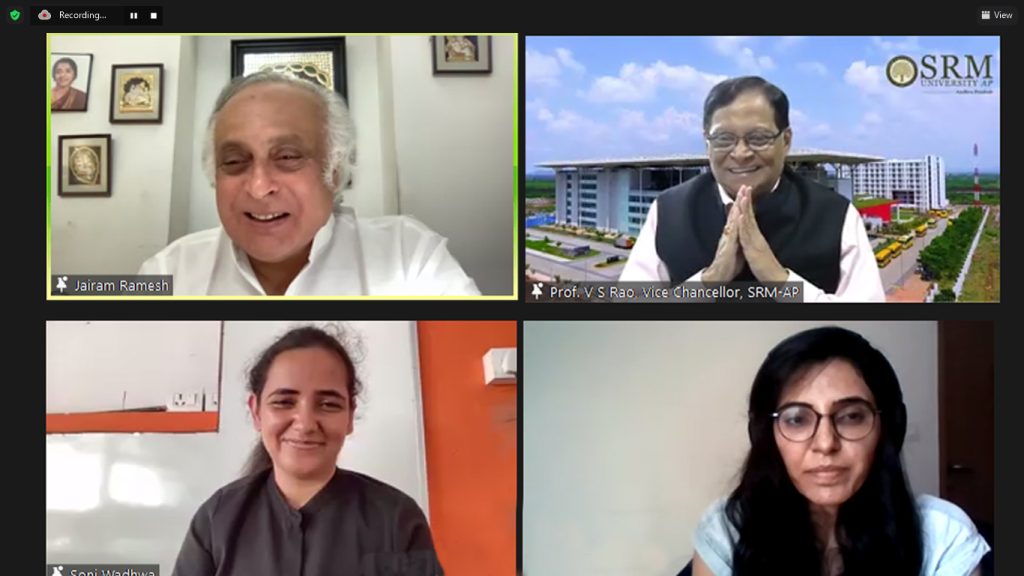 Regarding rejections of writing, he advised that failure should never be seen as something that deters a writer. He shared that his own journey began quite late and that his own writing goes through at least three drafts before it gets published. He emphasised that it happens because writing is an iterative process, in engineering terminology, and not a linear process, and that is what makes it a process full of surprises. He put a great emphasis on reading as well. To be a great writer, first, one needs to invest one’s time in order to be a good reader. He further shared his thought that this generation lacks the discipline of writing. It is never easy to communicate with readers until one is able to understand the mass psyche as writing is not only about expressing one’s point of view but also understanding the psychology of the targetted readers.
Regarding rejections of writing, he advised that failure should never be seen as something that deters a writer. He shared that his own journey began quite late and that his own writing goes through at least three drafts before it gets published. He emphasised that it happens because writing is an iterative process, in engineering terminology, and not a linear process, and that is what makes it a process full of surprises. He put a great emphasis on reading as well. To be a great writer, first, one needs to invest one’s time in order to be a good reader. He further shared his thought that this generation lacks the discipline of writing. It is never easy to communicate with readers until one is able to understand the mass psyche as writing is not only about expressing one’s point of view but also understanding the psychology of the targetted readers.
The universities need to establish a system whereby they can encourage students to read a body of work from disciplines other than their own and produce a paper at the end of their reading, Ramesh argued. The engineering students need to know what is happening in economics or literature, for instance. Similarly, students studying literature should know what is happening in sciences. This cross-fertilisation would help students get exposed to thinking in general.
The audience asked him several questions about the sources that can be consulted for getting better at writing, ways of integrating feedback into writing, means to writing with objectivity, balancing conscious effort with spontaneity and so on. His ideas inspired students and faculty alike.
Prof V S Rao, Vice-Chancellor of the University, who was there to welcome Ramesh kept interacting with him throughout the programme. He extended an invitation to Ramesh to visit the university early next year to motivate the students in person. The event ended with a vote of thanks by Faculty Coordinator Dr Supriya Daniel.
- Published in News, University Eminent Lecture Series
“The gateway to financial freedom” with Mr Rajnikanth C S
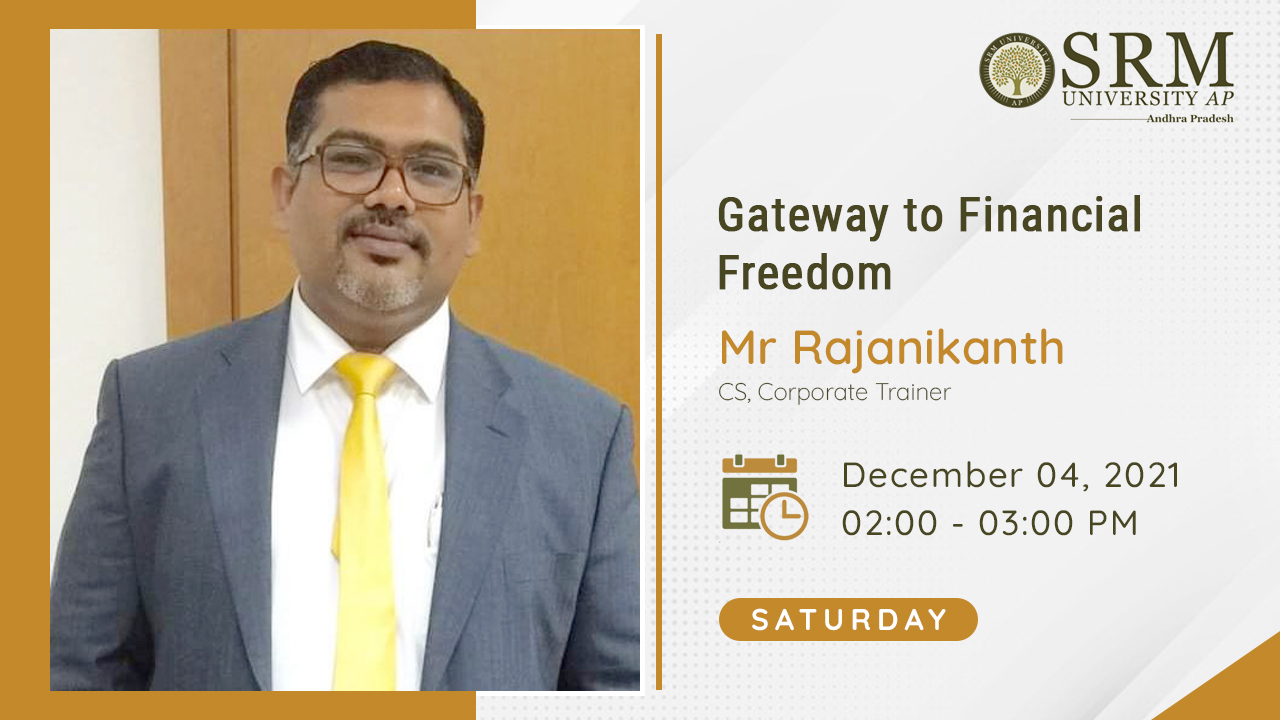
It is well accepted that there is a growing need for Industry academics tie-up to enable the students pursuing academics to understand the practical aspects of the industry simultaneously with their academic career. Hence, the Department of Corporate Relations and Career Services (CR&CS) at SRM University-AP is bringing in Corporate Trainer, Mr Rajanikanth C.S. on December 04, 2021, from 02.00 pm IST to 03.00 pm IST to tighten up the skills of our students.
About the speaker:
Mr Rajnikanth C S is a national level trainer registered with the State Skill Mission (SSM) Under the Ministry of Skill Development and Entrepreneurship India. He has delivered multiple talks as a motivational speaker. Over 5000 students and professionals have participated in his training and benefitted from them.
His understanding of the Financial Services Industry, AMCs, and Distribution Houses is expansive and the students participating in his training stand to benefit a lot from his 17+ years of industry experience in both India and abroad.
About the talk:
Financial Markets, especially the Capital Market, has the fastest growth rate amongst the various service industries. This has given many job opportunities and a challenging career to young incumbents. As a part of the CSR initiative, we are trying to enable the students to overcome the learning curve by providing practical knowledge through this Industry workshop.
In this workshop, the candidates will enjoy interactive industry sessions that can help them to acquire the concept of “financial freedom”, “basics of wealth creation & wealth management”, intricacies of the stock market, including the practical side, and career opportunities based on the current pandemic situation
So, make an opening in your calendar and do not be late, the talk starts at 02.00 pm IST and lasts till 03.00 pm IST. Be prepared to take notes on December 04, 2021, for a professional insight into having a career in finances
- Published in CR&CS, CR&CS Events, Events
Distinguished Lecture Series with Prof Ratnasingham Shivaji
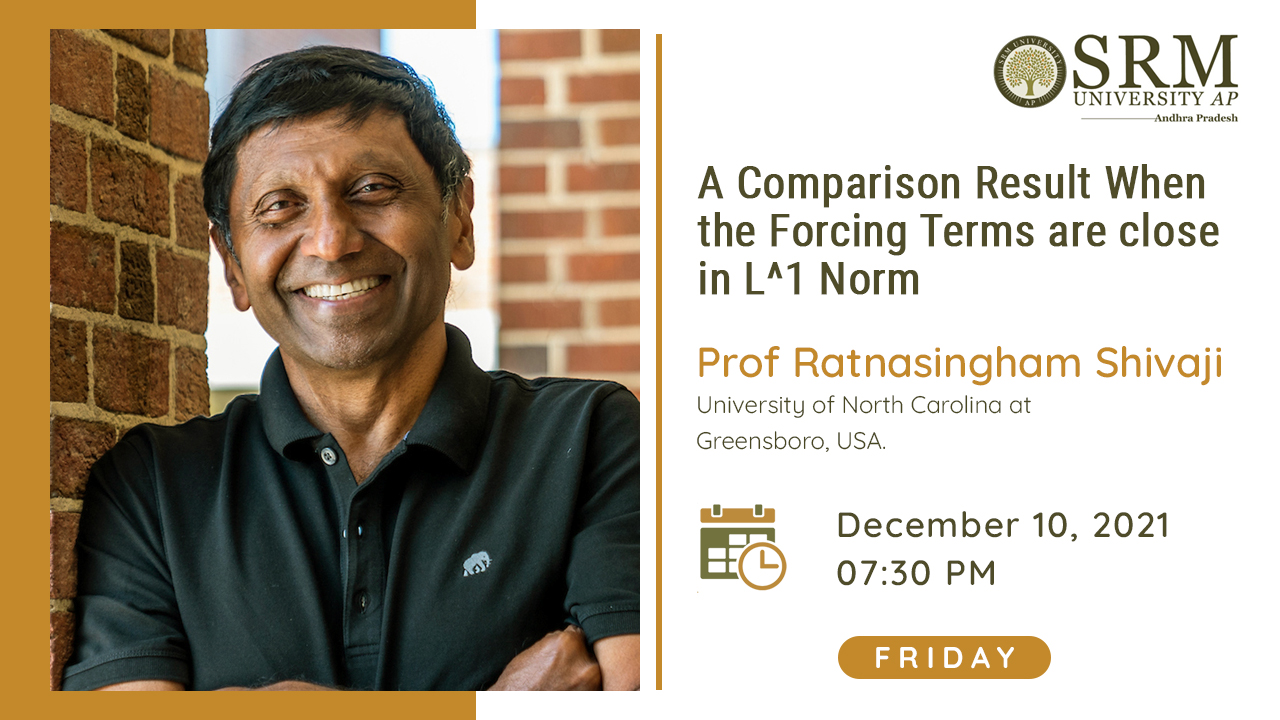 The Department of Mathematics is bringing to you the next thrilling edition of the Distinguished Lecture Series with Prof Ratnasingham Shivaji. Prof Shivaji will take the spotlight on December 10, 2021, at 7.30 pm IST and enlighten us about “A Comparison Result When the Forcing Terms are close in L^1 Norm.”
The Department of Mathematics is bringing to you the next thrilling edition of the Distinguished Lecture Series with Prof Ratnasingham Shivaji. Prof Shivaji will take the spotlight on December 10, 2021, at 7.30 pm IST and enlighten us about “A Comparison Result When the Forcing Terms are close in L^1 Norm.”
About the speaker:
Prof. Ratnasingham Shivaji received his PhD in Mathematics from Heriot-Watt University in Edinburgh, Scotland in 1981 and his B.S (first-class honours) from the University of Sri Lanka in 1977. He joined the University of North Carolina at Greensboro (UNCG) on July 1, 2011, as Head of the Department of Mathematics and Statistics and served in this position until July 31, 2019. Beginning in January of 2012, he was named H. Barton Excellence Professor. Prior to joining UNCG, he served for twenty-six years at Mississippi State University (MSU), where he was honoured as a W.L. Giles Distinguished Professor. In 2019, he was also named a Fellow of the American Mathematical Society. He is the recipient of the 2020 Mathematical Association of America (MAA) Southeastern Section Award for Distinguished University Teaching of Mathematics.
Prof. Shivaji’s area of specialization is partial differential equations, particularly in nonlinear elliptic boundary value problems. His research work has applications in combustion theory, chemical reactor theory, and population dynamics, and has been funded by the National Science Foundation and the Simon’s Foundation. Currently, he is serving as the PI on an NSF Math Ecology grant. He has authored one hundred and sixty research papers. He is a member of the Editorial Board of several mathematics journals.
Abstract:
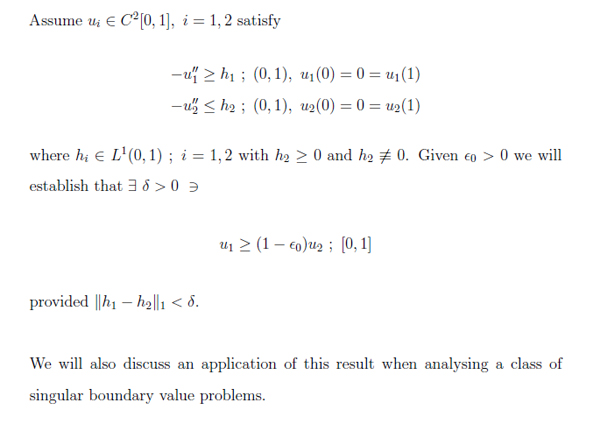
This session would provide a unique opportunity to interact with such a distinguished personality in the field of mathematics. Please make the most of this exciting opportunity on December 10, 2021, at 7.30 pm IST.
- Published in Departmental Events, Events, Math Events
On Applications of Machine Learning Methods in Physics
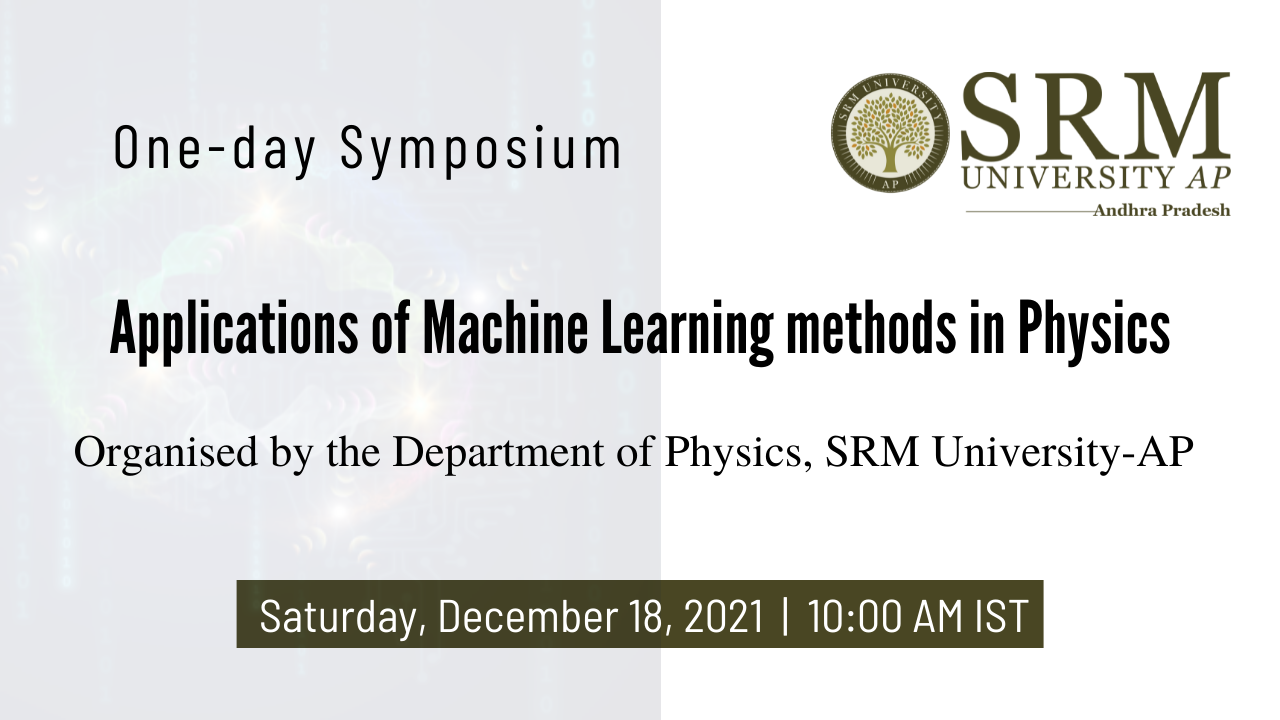
The Department of Physics at SRM University-AP is organising a one-day symposium with national and international academicians on the theme Applications of Machine Learning Methods in Physics. The programme which will begin at 10.00 am on December 18, 2021, will deeply look into two domains of research, namely Particle Physics and Statistical Physics. Eminent experts from computer science and physics domains will deliver talks for a wider audience, especially for students of basic sciences and engineering streams. The event is going to be entirely through Online mode. Dr Amit Chakraborty and Dr Soumyajyoti Biswas from the Department of Physics, SRM University-AP are the conveners of the symposium.
Programme Schedule of the Invited Lectures:
Time: 10.05 – 11.05 AM (IST)
Speaker: Prof Vineeth N Balasubramanian (IIT Hyderabad)
Title: Explainable Deep Learning: Overview, Trends and Challenges
Abstract: The last decade has seen rapid strides in Artificial Intelligence (AI) moving from being a fantasy to a reality that is a part of each one of our lives, embedded in various technologies. A catalyst of this rapid uptake has been the enormous success of deep learning methods for addressing problems in various domains including computer vision, natural language processing, and speech understanding. However, as AI makes its way into risk-sensitive and safety-critical applications such as healthcare, aerospace and finance, it is essential for AI models to not only make predictions but also be able to explain their predictions. This talk will introduce the audience to this increasingly important area of explainable AI, describe salient methods in explainable deep learning, discuss open challenges as well as present some of our recent research in this domain.
Time: 11.30 AM – 12.30 PM (IST)
Speaker: Dr Girish Varma (IIIT Hyderabad)
Title: Deep Generative Methods and Applications
Abstract: Generative methods deals with the modelling of complex high dimensional probability distributions. With the advent of deep neural networks, these methods have become more common with the discovery of new techniques like GANs. Such methods can learn to generate images, graphs etc even without using labelled data. In this talk, we will give some of the common deep generative modelling techniques like GANs, Variational Autoencoders, Normalizing Flows. We will also look at some example applications in Style Transfer, Super Resolution in Computer Vision, Conditional Generation of Molecules in Physics etc.
Time: 2.00 – 3.00 PM (IST)
Speaker: Dr Sanmay Ganguly (University of Tokyo, Japan)
Title: The Deep Relation Between Particle Physics and Machine Learning
Abstract: At the CERN Large Hadron Collider (LHC) experiment, trillions of protons get smashed with each other at very high energies every second. Remnants of this collision are collected and studied to infer what fundamental interactions are happening at the core. Analysing and extracting meaningful physics information out of this large data is a highly challenging statistical analysis, part of which has to be carried out in real-time. Modern deep learning techniques have brought a change in paradigm in the whole field, where it is observed that the application of ML truly impacts at all corners. In this presentation the speaker will try to give a general overview of the ongoing ML activities, mainly highlighting the areas in the context of LHC physics and shortly touch other branches of HEP.
Time: 3.30 – 4.30 PM (IST)
Speaker: Prof Lasse Laurson (Tampere University, Finland)
Title: Machine Learning Plastic Deformation of Crystals
Abstract: The speaker will present an overview of our recent efforts to apply machine learning to predict the fluctuating plastic deformation process of small crystals, mediated by the stress-driven motion of dislocations. To this end, we use machine learning to establish mappings between the initial state of a sample and the corresponding stress-strain curve, considering different loading protocols and geometries of the dislocation assembly. He will start with a discussion of machine learning the depinning process of edge dislocation pileups, after which he will consider the problem of machine learning-based prediction of the stress-strain response of two- dimensional systems of discrete dislocations subject to stress-controlled and strain-controlled loading.
Register soon and claim your seats at this one-day international online symposium organised by the Department of Physics, SRM University-AP!!
- Published in Departmental Events, Events, Physics, Sympossium
Who invented this? On the origin of disruptive technologies
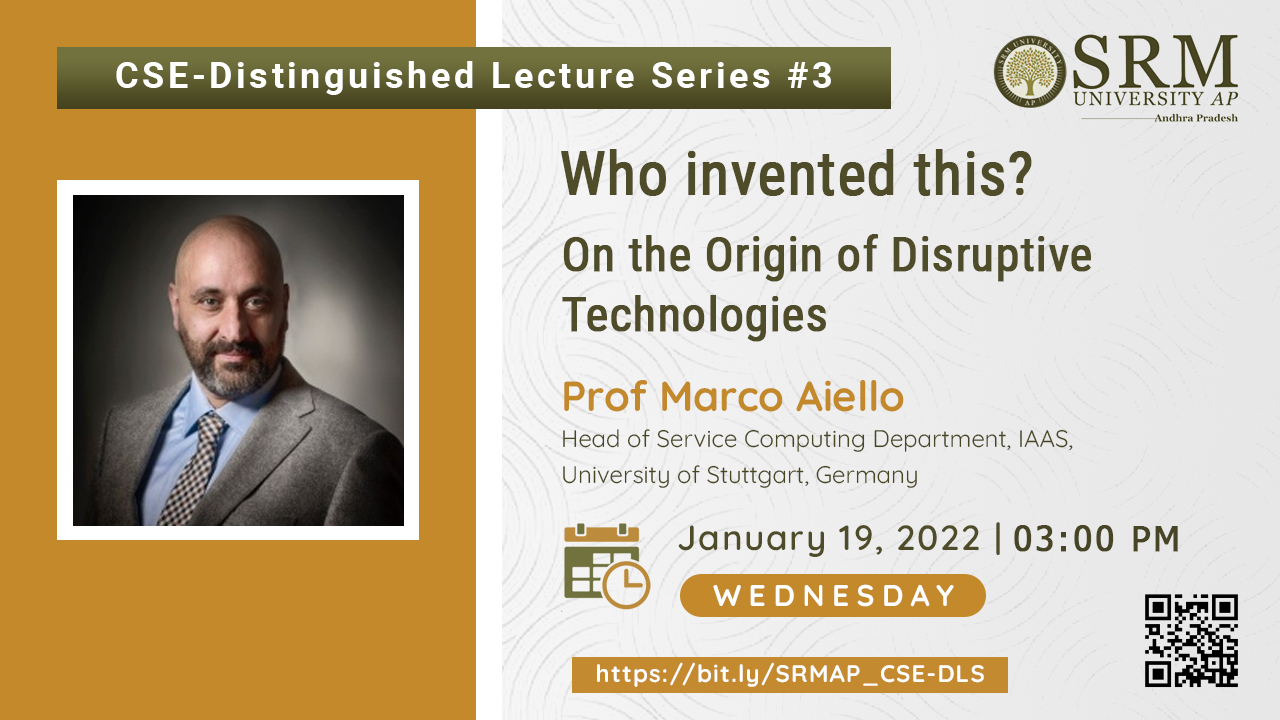
The Department of Computer Science and Engineering at SRM University-AP is organising the third lecture in the Distinguished Lecture Series on January 19, 2022, at 03.00 pm through virtual mode.
Prof Dr Marco Aiello, Head of Service Computing Department, IAAS in the University of Stuttgart, Germany, will be the esteemed speaker elaborating on the topic “Who invented this? On the Origin of Disruptive Technologies”.
The birth and evolution of ICT have been constellated by radical and rapid innovation originating from all kinds of sources. The Internet resulted from an effort started by the American government, Bluetooth came from a large European company, and the Web sprouted from a personal project of a CERN employee. In this talk, I will pick from the short but incredibly dense history of ICT to reflect on the evolution of innovation under the lenses of amateurism versus large scale, professional designs. In doing so, my main attention will be devoted to the Internet, the Web, and Service-Oriented Architectures.
Biography of Prof Dr Marco Aiello, University of Stuttgart, Germany
Marco Aiello is a professor of Computer Science and Head of the Service Computing Department at the University of Stuttgart, Germany. An elected member of the European Academy of Sciences and Arts, he is an honorary professor of Distributed Systems at the University of Groningen, The Netherlands, where he was a faculty member from 2006 till 2018. He holds a PhD in Logic from the University of Amsterdam, the Habilitation in Applied Informatics from TU Wien, and a master degree in Engineering from the La Sapienza University of Rome. His research interests are in Service Computing, Smart Energy Systems, Smart Buildings, and Spatial Reasoning. He is a member of the Scientific Advisory Board for Informatics of the Lorentz Center, Leiden, The Netherlands and Steering committee Faculty of Exact Sciences, University of Modena and Reggio Emilia, Italy. He has been a board member of the start-up Nerdalize BV, The Netherlands and Visiting Fellow of Macquarie University, Australia.
He has authored over 190 peer-reviewed articles and several books, including two bestsellers, and the most recent “The Web Was Done by Amateurs: A Reflection on One of the Largest Collective Systems Ever Engineered” published by Springer-Nature. He is a steering committee chair of the Service-Oriented Computing and Applications (SOCA) Conference. He has delivered several invited/panel talks at reputed conferences and workshops. He is the Editorial Board of various reputed journals like Energy Informatics (Springer), Journal on Service-Oriented Computing and Applications (Springer), International Journal of Web Services Research (IJWSR), Annals of Computer Science and Information Systems. He was the Information Director of the Transactions on Computational Logic of the Association of Computing Machinery (ACM) from its foundation in 2000 until 2014. He has got several awards and recognitions. He has executed 12 research projects. Since 2006, he has been investigating Service-centric software engineering, Smart energy cities, Energy-aware buildings, Energy-aware data centres and many more.
Stay tuned, and don’t forget to participate in this invigorating session on January 19, 2022.
- Published in CSE EVENTS, Departmental Events, Events, Webinars

